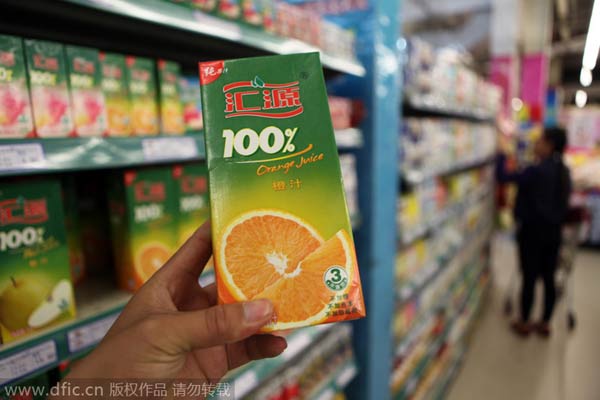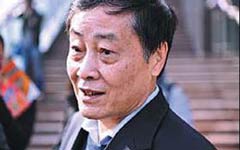 |
|
A customer buys a carton of Huiyuan orange juice at a supermarket in Rizhao city, East China's Shandong province, May 7, 2014. [Photo/IC] |
China Huiyuan Juice Group Ltd expects sales to rise at least 10 percent in the second half of the year as it expands in the domestic and overseas markets, and seeks to supply China's 1.5 million-strong military.
"The meals of our vast Chinese army are very important. We need to supply our soldiers with nutritious drinks," Executive Vice-President Yu Hongli, who takes over as chief executive officer next month, said in an interview. "We have salespeople expanding into this channel."
Huiyuan, China's largest producer of pure juice, is competing with Coca-Cola Co, PepsiCo Inc and Tingyi Cayman Islands Holding Corp for Asia's beverage market by widening its sales footprint. The company, which acquired Suntory Holdings Ltd's China assets in May, plans to add a production line in Malaysia, Yu said, declining to give details on either its investment budget or production capacity.
|
|
|
 |
The juice-maker has stepped up its distribution network and is now selling in places in southern China that its distributors didn't cover in the past, Yu said. The company also plans to sell products outside the Chinese mainland, starting with Hong Kong and Macao at the end of this month and later in Southeast Asia, she said, without naming specific countries.
The company's first-half revenue fell 5 percent to 1.97 billion yuan ($321 million) from a year earlier, amid a shift by Chinese consumers to healthier beverages from low-concentrate juices, it reported on Sunday. Net income plunged 82 percent to 20.5 million yuan in the first six months ending in June, as finance costs almost doubled following its acquisition of a puree business, the Beijing-based company said.
Sales of juice drinks, which made up 22 percent of total sales, declined 26 percent, while those from 100-percent fruit juice, which accounted for 20 percent of the total, fell 7 percent. Other income, including sales of raw materials and subsidies, dropped 62 percent, it said.
In addition to supplying the military, Huiyuan also will partner with hotels and railway operators in China to provide beverages to patrons, and it already has been supplying Air China Ltd flights as well as schools, according to Yu.
The People's Liberation Army is one of the world's biggest armed forces, with 850,000 in the army, 235,000 in the navy and another 398,000 in its air force, the official Xinhua News Agency reported last April, citing a government-issued national defense white paper.
Huiyuan shares fell 1.5 percent to HK$3.24 at the close of trading in Hong Kong on Thursday, while the benchmark Hang Seng Index was little changed. The stock has plunged 35 percent so far this year, against the Hang Seng's 8.5 percent gain.
The company also plans to roll out Suntory non-juice products such as bottled oolong tea and coffee drinks, Yu said. Sales contributions from Suntory products will be recorded in Huiyuan's book next year, the 45-year-old said.
Huiyuan is hoping to lift gross profit margins back to above 30 percent in the second half by cutting back on TV advertisements and using more social media, the incoming chief executive said. Margins fell to 29.4 percent in the first half, from 31 percent in the preceding period.
Yu will take over as CEO on Oct 1, replacing Daniel Saw, who joined the company in July of last year. Saw will remain as a consultant to founder and chairman Zhu Xinli to develop Huiyuan's international business, it announced on Friday.
The company was the largest maker of 100-percent juice and nectars in China, with a market share of 37 percent and 23 percent, respectively, according to market researcher Euromonitor International Plc.
